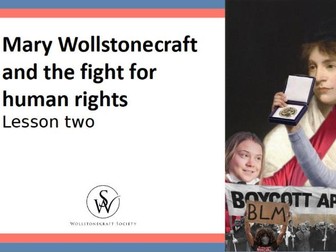Mary Wollstonecraft and Human Rights
<p>We are launching the Wollstonecraft School programme, with an invitation to upper key stage two classes up and down the country to join us.</p>
<p>Taking a whole school approach, primary schools will be able to show how they champion human rights in three easy steps by learning about Mary Wollstonecraft and her legacy. In just one week schools can gain their accreditation as human rights champions, with a certificate from the Wollstonecraft Society.</p>
<p><strong>Lesson One</strong> - A fun introduction to Mary through an engaging online comic</p>
<p><strong>Lesson Two</strong> - Group work to consolidate your classes newfound learning and put together an assembly to share it with the rest of their school</p>
<p><strong>Assembly (and maybe a rehearsal or two!)</strong> Then use the powerpoint template provided for your class to share Mary’s story with more members of your school<br />
Once you’ve completed steps 1,2 and 3 - scan in or photograph five of your learners feedback forms and fill in a quick online survey - and we’ll get your certification of accreditation over to you.</p>
<p>All you need to complete this programme is right here;</p>
<ul>
<li>Lesson 1 powerpoint</li>
<li>Lesson 2 powerpoint (which is filled in throughout the lesson and used as the assembly powerpoint when complete)</li>
<li>Teachers Guide</li>
<li>Workbooks</li>
</ul>
<p>We’ll be creating more Wollstonecraft school resources for different year groups soon, check out the Wollstonecraft Society website and TES channel fore more resources soon.</p>
<p><strong>Curriculum links:</strong><br />
We have identified the following areas where our resources support the curriculum:</p>
<p><strong>History</strong></p>
<ul>
<li>a study of an aspect or theme in British history that extends pupils’ chronological knowledge beyond 1066</li>
</ul>
<p><strong>PSHE</strong></p>
<ul>
<li>about different feelings that humans can experience</li>
<li>how to recognise and name different feelings</li>
<li>how feelings can affect people’s bodies and how they behave;</li>
<li>to recognise that anyone can experience mental ill health; that most difficulties can be resolved with help and support; and that it is important to discuss feelings with a trusted adult</li>
<li>about the roles different people (e.g. acquaintances, friends and relatives) play in our lives</li>
<li>to identify the people who love and care for them and what they do to help them feel cared for</li>
</ul>
<p><strong>British Values</strong></p>
<ul>
<li>encourage students to accept responsibility for their behaviour, show initiative, and to understand how they can contribute positively to the lives of those living and working in the locality of the school and to society more widely</li>
<li>an understanding of how citizens can influence decision-making through the democratic process</li>
<li>an understanding of the importance of identifying and combatting discrimination</li>
</ul>
<p><strong>Supporting Literacy and English Teaching</strong></p>
<ul>
<li>continuing to read and discuss an increasingly wide range of fiction, poetry, plays, non-fiction and reference books or textbooks<br />
participate in discussions about books that are read to them and those they can read for themselves, building on their own and others’ ideas and challenging views courteously</li>
</ul>
